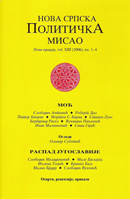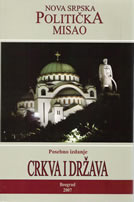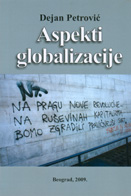| NSPM in English | |||
No Putinism without Putin |
 |
 |
 |
| понедељак, 26. септембар 2011. | |
|
(The National Interest, September 26, 2011)
This announcement, which was cast by both domestic and international media as Putin’s triumphant return to the presidency after a four-year Medvedev caretaker administration, in fact reveals some fundamental weaknesses in the post-Soviet Russian political order. First and foremost, it is a frank admissionthat there is no such thing as Putinism without Putin—that the system Putin created of balancing competing sectoral and clan interests within the Kremlin establishment cannot be run by any other person. Keeping in perspective that Putin has been president and prime minister already for twelve years, it does not bode well that Putin must still remain personally involved and at the helm for his system to function. (On a separate note, this also appears to be the reality in Venezuela: the “Bolivarian Revolution” rises or falls with one person, Hugo Chavez, whose temporary relinquishment of power during his cancer treatments earlier this year only highlighted that his regime also has no successor capable of taking and holding power in his place.) The continued overreliance on personal power to make Russia function is also a continuing setback to some of Putin’s advisors, notably Vladislav Surkov, who has spent years trying to institutionalize the Putin approach into a self-replicating regime that could hold power and recruit the next generation of leaders to sustain the existing power structure. Certainly the global economic crisis and the Georgia war damaged the efforts to promote a smooth transition in 2008, but the growing sense that the Russian elite might follow in the footsteps of its Ukrainian and Georgian counterparts and begin to divide into competing factions, leading to conditions that might even lead to a “color revolution” meant that Putin had to be called back to openly retake the reins, instead of embracing a “national leader” role who could pass along more responsibilities not only to Medvedev in a second term, but then even consider retiring from day-to-day functions as head of government by stepping down from the prime ministership. The United Russia congress also shows how far Russia is from being able to replicate the electoral model of Japan or India—two countries where one strong national party dominated national politics for decades. Unlike the Liberal Democratic Party in Japan or India’s Congress (especially during the Jawaharlal Nehru years), United Russia is neither a mass party with a strong membership base nor does it truly represent a series of powerful interest groups which then use the party structure as a way to negotiate policy. Nor does United Russia particularly distinguish itself in the realm of constituent service in the way that the political bread-and-butter of the LDP and the Congress was in showing voters that, despite the corruption and nepotism in their political systems, the parties could deliver tangible benefits to their voters. Instead, United Russia remains focused on the person and personality of Putin, with no clear ideology and no cadres of political figures who are proven local leaders. Indeed, the slow but steady erosion in the party’s standing led first to the creation of the Popular Front as a way to try and bring fresh blood into the system, and second to a wholescale “purge” of the party’s list for the 2011 Duma elections. Nearly half of the current United Russia deputies will not be retained as candidates for this December’s poll, with 360 “completely new” party-list candidates added and 185 brought in via the Putin-created Popular Front. In addition, each of the deputy prime ministers has been assigned with responsibility for a different region of the country, in an effort to show to average Russians that every region will have a high-ranking Kremlin official in theory “looking out” for their interests and to serve as their “lobbyist” in the councils of government. The news from Moscow was also problematic for the Barack Obama administration (and for other Western governments) which had invested heavily in a particular narrative of Russian politics that stressed the importance of supporting President Medvedev as a way to signal support for reform and change in Russia. The discipline displayed by both members of the tandem—with Medvedev nominating Putin for president and with Putin announcing that Medvedev—who will head the federal electoral list of United Russia—should become the next prime minister of Russia seems to indicate that while there may have been disagreements at the margins, the metaphor of a political struggle between a “conservative,” anti-Western, statist Putin and his group versus a “liberal,” pro-Western, pro-market Medvedev was greatly exaggerated. On the other hand, Russia’s need for a balanced foreign policy would prevent any radical shifts in policy. But personal relations can have an impact on how interests are interpreted and negotiated, and Medvedev’s ability to forge good working relationships, particularly with Obama and Nicolas Sarkozy of France, did help as well. Perhaps one reason for “switching the tandem”—assuming that the expanded powers of the prime minister in foreign and defense matters are retained when Putin returns to the Kremlin—would be for Medvedev to continue to be able to play a major role in overseeing those relationships. Another interesting question will be whether, as prime minister, Medvedev would have more success in helping to recruit the next generation of Russian leaders. By having Putin handle the Kremlin clan-balancing act, Medvedev might then be in a position to restaff the government with new cadres in a way he was unable to do so as president. An important bellweather would then be the futures of some of the existing deputies—notably Igor Sechin (who was already somewhat demoted in clashes with Medvedev and who was required to resign his chairmanships of key state companies) but also Alexei Kudrin, the finance minister, who has already publicly indicated that he would not serve in a Medvedev cabinet. While speaking sarcastically, Kudrin’s statement that Medvedev, as prime minister, would seek to install “a team of young, effective managers” might be pointing to the role Medvedev would be expected to play. The 2008 transition, for all intents and purposes, failed. Putin’s return to the presidency seems designed to reboot the system, and to see whether Putin 2.0 can be more successful than the first incarnation in producing a lasting political order for Russia. Nikolas K. Gvosdev, a senior editor at The National Interest, is a professor of national-security studies at the U.S. Naval War College. The views expressed are entirely his own. |
Остали чланци у рубрици
- Playing With Fire in Ukraine
- Kosovo as a res extra commercium and the alchemy of colonization
- The Balkans XX years after NATO aggression: the case of the Republic of Srpska – past, present and future
- Из архиве - Remarks Before the Foreign Affairs Committee of the European Parliament
- Dysfunction in the Balkans - Can the Post-Yugoslav Settlement Survive?
- Serbia’s latest would-be savior is a modernizer, a strongman - or both
- Why the Ukraine Crisis Is the West’s Fault
- The Ghosts of World War I Circle over Ukraine
- Nato's action plan in Ukraine is right out of Dr Strangelove
- Why Yanukovych Said No to Europe

.jpg)








 The congress of the “United Russia” party held this past weekend proved to be quite newsworthy, in that current president Dmitry Medvedev, from the rostrum, formally nominated his predecessor (and current prime minister) Vladimir Putin to be the party’s nominee for the 2012 elections.
The congress of the “United Russia” party held this past weekend proved to be quite newsworthy, in that current president Dmitry Medvedev, from the rostrum, formally nominated his predecessor (and current prime minister) Vladimir Putin to be the party’s nominee for the 2012 elections.














